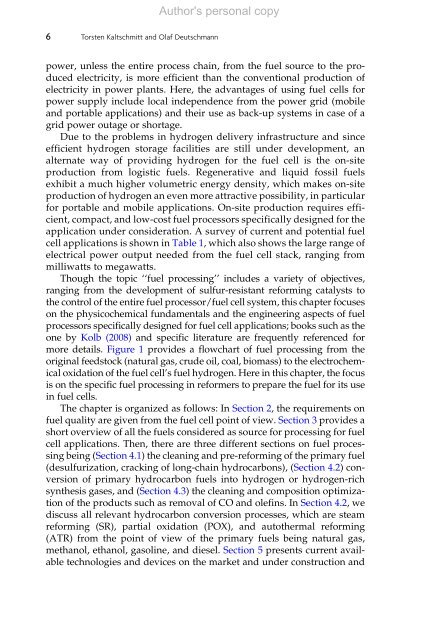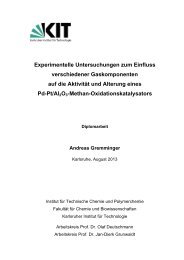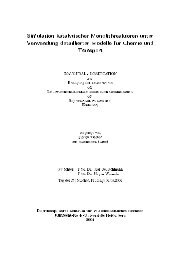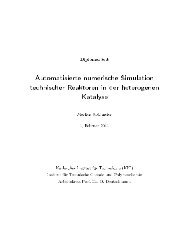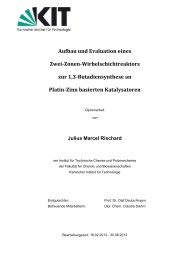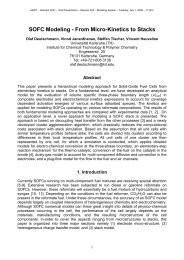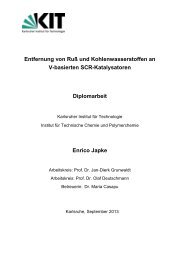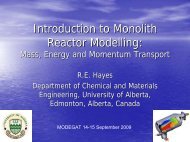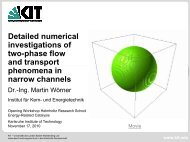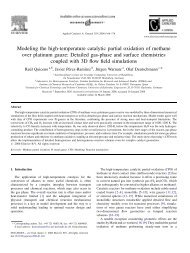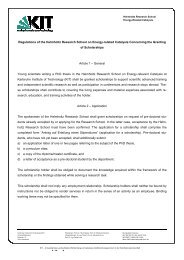Fuel Processing for Fuel Cells - Institut für Technische Chemie und ...
Fuel Processing for Fuel Cells - Institut für Technische Chemie und ...
Fuel Processing for Fuel Cells - Institut für Technische Chemie und ...
Create successful ePaper yourself
Turn your PDF publications into a flip-book with our unique Google optimized e-Paper software.
Author's personal copy<br />
6 Torsten Kaltschmitt and Olaf Deutschmann<br />
power, unless the entire process chain, from the fuel source to the produced<br />
electricity, is more efficient than the conventional production of<br />
electricity in power plants. Here, the advantages of using fuel cells <strong>for</strong><br />
power supply include local independence from the power grid (mobile<br />
and portable applications) and their use as back-up systems in case of a<br />
grid power outage or shortage.<br />
Due to the problems in hydrogen delivery infrastructure and since<br />
efficient hydrogen storage facilities are still <strong>und</strong>er development, an<br />
alternate way of providing hydrogen <strong>for</strong> the fuel cell is the on-site<br />
production from logistic fuels. Regenerative and liquid fossil fuels<br />
exhibit a much higher volumetric energy density, which makes on-site<br />
production of hydrogen an even more attractive possibility, in particular<br />
<strong>for</strong> portable and mobile applications. On-site production requires efficient,<br />
compact, and low-cost fuel processors specifically designed <strong>for</strong> the<br />
application <strong>und</strong>er consideration. A survey of current and potential fuel<br />
cell applications is shown in Table 1, which also shows the large range of<br />
electrical power output needed from the fuel cell stack, ranging from<br />
milliwatts to megawatts.<br />
Though the topic ‘‘fuel processing’’ includes a variety of objectives,<br />
ranging from the development of sulfur-resistant re<strong>for</strong>ming catalysts to<br />
the control of the entire fuel processor/fuel cell system, this chapter focuses<br />
on the physicochemical f<strong>und</strong>amentals and the engineering aspects of fuel<br />
processors specifically designed <strong>for</strong> fuel cell applications; books such as the<br />
one by Kolb (2008) and specific literature are frequently referenced <strong>for</strong><br />
more details. Figure 1 provides a flowchart of fuel processing from the<br />
original feedstock (natural gas, crude oil, coal, biomass) to the electrochemical<br />
oxidation of the fuel cell’s fuel hydrogen. Here in this chapter, the focus<br />
is on the specific fuel processing in re<strong>for</strong>mers to prepare the fuel <strong>for</strong> its use<br />
in fuel cells.<br />
The chapter is organized as follows: In Section 2, the requirements on<br />
fuel quality are given from the fuel cell point of view. Section 3 provides a<br />
short overview of all the fuels considered as source <strong>for</strong> processing <strong>for</strong> fuel<br />
cell applications. Then, there are three different sections on fuel processing<br />
being (Section 4.1) the cleaning and pre-re<strong>for</strong>ming of the primary fuel<br />
(desulfurization, cracking of long-chain hydrocarbons), (Section 4.2) conversion<br />
of primary hydrocarbon fuels into hydrogen or hydrogen-rich<br />
synthesis gases, and (Section 4.3) the cleaning and composition optimization<br />
of the products such as removal of CO and olefins. In Section 4.2, we<br />
discuss all relevant hydrocarbon conversion processes, which are steam<br />
re<strong>for</strong>ming (SR), partial oxidation (POX), and autothermal re<strong>for</strong>ming<br />
(ATR) from the point of view of the primary fuels being natural gas,<br />
methanol, ethanol, gasoline, and diesel. Section 5 presents current available<br />
technologies and devices on the market and <strong>und</strong>er construction and


